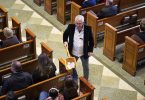
by Joe Bollig
joe.bollig@theleaven.org
KANSAS CITY, Kan. — Isn’t work supposed to be work? What does fun have to do with it?
Just ask Leon Roberts.
In the 1990s, Roberts was a hard-driving executive with a prestigious Kansas City area architectural firm. But the long hours and stress took their toll, so he left the partnership for health reasons.
Nobody would have blamed him if he had just coasted into retirement.
But he didn’t.
On April 11, 2000, he became archdiocesan director of real estate and construction. That’s when the fun began.
“When I came here from Hollis & Miller, owning a 60-person architectural firm, I had forgotten you could enjoy work,” said Roberts. “I regained that knowledge when I came here.
“It’s had its moments when it has been difficult. But for the most part, it has just been enjoyable — enjoyable to see our parishes grow and flourish, and take seriously the stewardship of their facilities.
“For me,” he continued, “it has been extremely rewarding. In fact, I’ve gotten more out of it than I thought I would.”
Roberts, a member of Church of the Ascension in Overland Park, will officially end his 20-year-career with the archdiocese on Dec. 31. He has been working through a transition period since July with his successor, Dan Himmelberg.
A lot of people are going to miss Roberts, Carla Mills among them.
“He’s a hoot,” said Mills, archdiocesan chief financial officer. “He knows the importance of lightening up.”
Large, complex projects costing thousands or even millions of dollars can be difficult to manage, if not downright exasperating. Getting all the parties to work harmoniously requires finesse, diplomacy, patience and good humor.
“Leon’s very collaborative,” said Mills. “His approach is always to come to a conclusion that makes everyone happy. We may start down one path and suddenly encounter a roadblock. Leon is the one who finds a way around the roadblock to still make things happen.”
What was his greatest achievement during his 20-year tenure at the archdiocese?
“Staying,” Roberts deadpanned. “Surviving.”
Actually, he hates to use the term “greatest achievement.” He also hates to use the word “proud.” Excitement will have to do.
“One of the things I’m most excited about is the relationships that my office has established with each of the parishes and their willingness to call me and ask for help,” he said.
“And I’m really excited about the fact that most have moved away from a deferred maintenance arrangement to being proactive about taking care of their facilities,” he added, “and truly being good stewards of their facilities.”
Perhaps his greatest achievement, however, is being the founding father of his role.
“It did not exist,” he said. “[My responsibilities] were folded into several offices, with each playing a role somewhat, but no one grabbing the reins and executing what needed to be executed.”
Having an archdiocesan office dedicated to real estate and contracting meant that projects became easier and more manageable.
“Another thing that came about was more consistent response for contracts — architectural, engineering, construction — so therefore, there were more opportunities for successful outcomes,” said Roberts.
It helps that he had been on both the architect’s and the contractor’s side of the equation.
“So, I understand what the right roles are for the architect, the engineer and the contractor,” he said, “and know how to get the most out of those roles.”
Name any big, Catholic project of the past 20 years — St. James Academy, Santa Marta retirement community, new church construction and renovations — and Roberts has played a role.
Not all of it has involved new construction, however. He has advised parishes what to do with buildings following clustering, managed the fix of that leaky toilet at the archbishop’s residence or made sure vacant land was mowed.
Managing relationships was a big part of his job.
Mills said she appreciated how Roberts was able to connect personally with the many people he’s had to work with on the various projects.
“He got to know the pastors, the building committee chairpersons, the different parishioners involved in each project,” she said.
“It’s a very confusing process if you don’t work with it every day,” she added. “He [could] take it down and walk people through every step, making sure they got what they want and got value for what they [paid].”
What does Roberts plan to do for retirement?
“Whatever I want,” he said with a smile.
But he did mention mentoring young architects and volunteering his services to his parish as high on his list.
“My wife and I have decided not to plan anything,” said Roberts. “It’s just going to be: ‘If we want to do something today, that’s what we’ll do.’”






